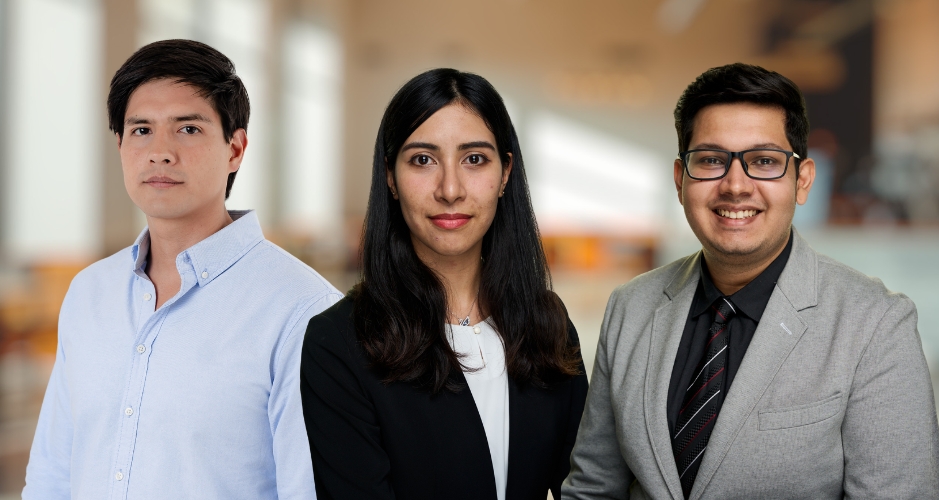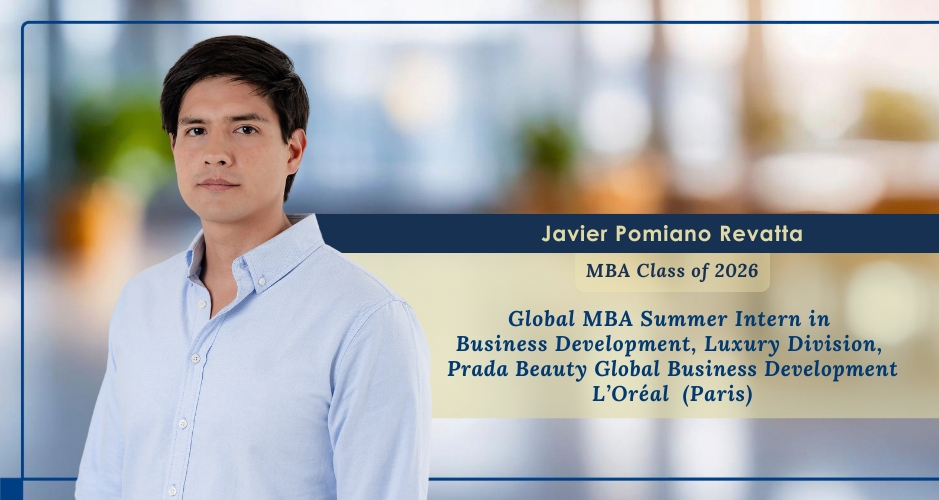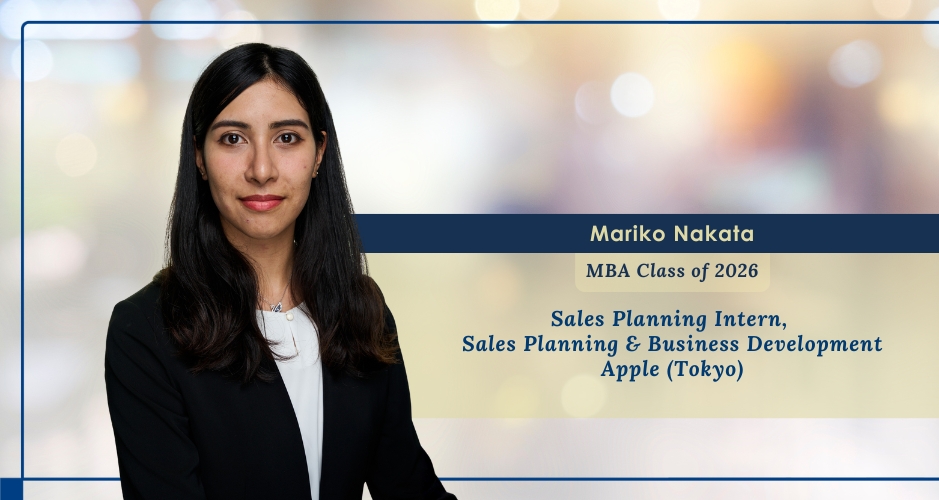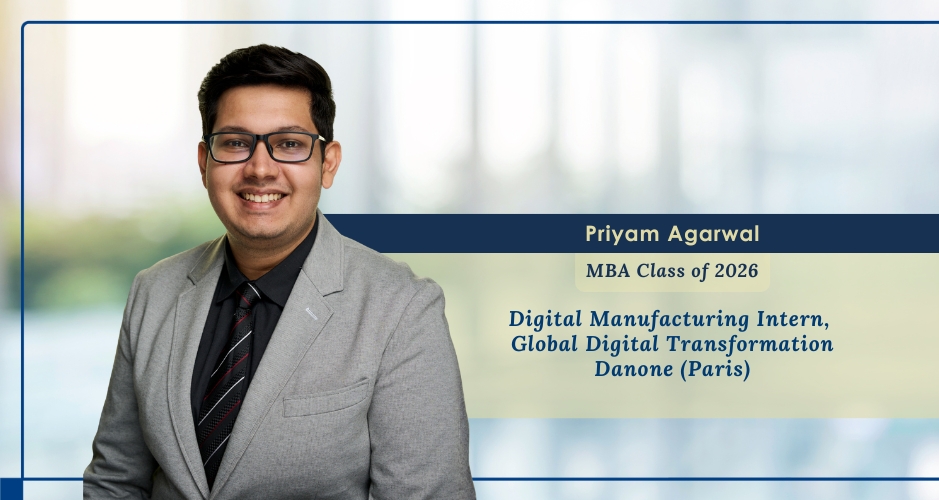From Paris to Tokyo: HEC Paris MBA Interns Make Their Mark at L’Oréal, Danone, and Apple
From Paris to Tokyo: HEC Paris MBA Interns Make Their Mark at L’Oréal, Danone, and AppleEach year, HEC Paris MBA students take their classroom insights into the real world through summer internships at leading global companies. For members of the MBA Class of 2026, these experiences became defining moments of professional growth and discovery.
From coordinating a worldwide fragrance launch at L’Oréal to driving digital transformation at Danone and learning the art of the “Apple-way” presentation in Tokyo, Javier Pomiano Revatta, Priyam Agarwal, and Mariko Nakata share how their internships shaped their leadership skills, strengthened their career goals, and deepened their global business perspectives.
Name, Graduation Year:
Javier Pomiano Revatta, MBA ‘26
Before joining HEC Paris, Javier held strategy and business development roles in Peru and Ecuador, gaining early finance experience at L’Oréal Peru and later leading strategic initiatives and regional expansions at Credicorp Capital and Camila Viali. After graduation, he aims to pursue corporate strategy or business development in a global consumer-focused company, leveraging his dual degree from HEC Paris and Tufts University.
Internship Title and Company:
Global MBA Summer Intern in Business Development, Luxury Division, Prada Beauty Global Business Development at L’Oréal (Paris)
What motivated you to pursue this internship, and how did it align with your career goals?
I pursued this internship because I wanted to apply my strategic and analytical background in a truly global environment, where decisions are made at the intersection of data, creativity, and business execution. After several years of leading expansion and business development projects across Latin America, I was eager to understand how global consumer brands like L’Oréal manage large scale product launches, pricing strategies, and market adaptations across regions.
My earlier experience at L’Oréal Peru, where I began my professional career, was also a decisive factor in my motivation to return. I already knew the company’s culture, its strong sense of purpose, and its deep commitment to innovation and social impact. This familiarity gave me confidence that it was the right place to keep growing professionally. Ultimately, the internship aligned perfectly with my long-term goal of developing a career in global strategy and business development, focused on building cross market solutions that combine analytical rigor, creativity, and impact.
What was the most challenging aspect of the internship, and how did you tackle it?
One of the biggest challenges was the need to adapt quickly and perform at a high level within a very short time frame. MBA summer internships last only three months, which means there’s little time to fully understand the company culture, the brand dynamics, the projects, and the industry. From the very first days, I had to learn fast, integrate into the team, and deliver meaningful results to make a difference. Another key challenge was developing self-leadership and confidence in my projects. As MBA interns, expectations are high companies trust us to take ownership, show initiative, and operate independently based on our previous experience and training. I was entrusted with global projects that required strategic thinking and execution autonomy, which pushed me to trust my judgment and take decisive action. Thanks to this mindset, I was able to propose new initiatives, lead high-impact projects, and earn the confidence of my managers. Looking back, I realized that in fast-paced environments, adaptability and self-confidence are just as critical as technical skills; they allow you to turn a short internship into a lasting contribution.
What was a highlight or proudest moment from your internship?
The highlight of my internship was leading the global coordination of the launch of Prada Paradigme, the newest men’s fragrance from Prada. I served as the main link between L’Oréal’s headquarters and Prada’s headquarters, ensuring that the fragrance and all launch materials were delivered on time to boutiques across more than eight regions, including Europe, Latin America, the United States, South and North Asia, and the Middle East. The project required flawless precision and cross-market alignment, as each region had its own calendar, regulations, and market dynamics. My managers entrusted me with this responsibility because of the autonomy and confidence I had shown early on, and I took full ownership of both the logistical and strategic coordination of the global rollout. Seeing Prada Paradigme successfully launched around the world was an incredibly rewarding experience. Today, every time I travel and see the fragrance displayed in airports or boutiques, I feel proud knowing I played a key role in bringing it to life. It reminded me that even in just three months, with dedication, precision, and passion for excellence, you can make a lasting global impact.
How did your MBA experience help you succeed during the internship?
My MBA experience at HEC Paris played a fundamental role in helping me succeed during my internship. The program provided not only a strong academic foundation through courses in strategy, marketing, and finance but also the practical tools to connect data-driven thinking with creative business execution skills that were essential for managing global projects like the launch of Prada Paradigme.
Beyond the classroom, HEC’s emphasis on leadership development was equally impactful. Experiences such as the Outdoor Leadership Seminar helped me strengthen my ability to lead under pressure, build trust quickly, and communicate effectively across diverse teams’ capabilities that proved invaluable in a fast-paced, multicultural corporate environment. Additionally, serving as President of the LATAM Club taught me how to inspire and coordinate people from different backgrounds toward a shared goal. That experience translated directly into the workplace, where I had to align multiple international stakeholders, manage complex timelines, and make strategic decisions independently.
In many ways, the MBA gave me both the strategic mindset and the leadership confidence to turn challenges into opportunities and to add value from day one of my internship.
What transferable skills from your previous career helped you in this new role?
Coming from a background in strategy and business development, I brought a combination of analytical thinking, leadership, and adaptability that proved essential during my experience at L’Oréal. Leading multi-market projects across Peru and Ecuador taught me how to coordinate cross-functional teams, manage complex challenges, and balance both strategic and operational priorities. At L’Oréal, these skills allowed me to go beyond coordination. I contributed to designing a pricing optimization model across eight regions, developed and presented performance and sell-out analyses for Europe, North America, and Asia, and translated complex data into actionable insights for senior management.
Finally, what helped me the most was the ability to combine structure with creativity, leading projects that required both analytical discipline and strategic vision—a balance that defined my contribution throughout the internship.
What advice would you give to future MBA students preparing for their own summer internships, especially those changing careers?
For those making a significant career transition, my main advice is to prepare thoroughly for the technical skills your new role or industry will demand. Competition is strong, and having solid knowledge before starting will make your adaptation period much faster and help you stand out. HEC offers outstanding courses, but true mastery comes from taking the initiative to go deeper on your own. Career changes don’t always have to happen abruptly. In large multinational companies, there are often opportunities to rotate internally across roles, brands, or even countries. This means you can start in a position that bridges your current strengths with your new interests, and then progressively move toward your long-term goal as you build experience and credibility. Finally, be strategic and flexible when applying. Each MBA student brings unique strengths and experiences, so some positions will be a natural fit, while others may not. Diversify your applications across companies, sectors, and geographies, you never know where the right opportunity might emerge.
Name, Graduation Year:
Mariko Nakata, MBA ‘26
Prior to the HEC Paris MBA Mariko was an attorney at law and advised clients' cross-border transactions, investments, regulations, IP strategies, litigation, and investigations. In the short-to-midterm, she wants to pivot into the tech or media industry or a startup. Long term, she would like to become a politician to improve communities, empower people and achieve a better world.
Internship Title and Company:
Sales Planning Intern, Sales Planning & Business Development, Apple, Tokyo
What motivated you to pursue this internship, and how did it align with your career goals?
I personally love Apple since I started using its device many years ago, and particularly because of the people-centric philosophy in its product design and business commitment. Apple’s business covers all aspects of business models, including B2C, B2B, manufacturing, platform, service, retail, e-commerce, media and brand, providing almost infinite learning opportunities about the business for someone who has curiosity and appetite for growth. The internship at Apple gave me a dense learning experience, which accelerates my career transition from a lawyer into the business role in the tech industry.
What was the most challenging aspect of the internship, and how did you tackle it?
There were many hypotheses about the business problem that needs to be solved, and not all information was available. So, I had to iterate on fact-finding and hypothesis testing by talking to people, researching and analyzing data under time constraints. This was challenging, but very exciting at the same time.
What was a highlight or proudest moment from your internship?
The final presentation was a great opportunity to learn how to deliver all of the projects in the Apple-way presentation, [a minimalist, story-driven, and emotionally engaging presentation approach].
How did your MBA experience help you succeed during the internship?
My MBA experience helped every aspect of the internship. (i) Core Classes: For a cross functional role like this internship, what I learned in the marketing, finance, accounting, managerial accounting and control, economics, operation, and strategy courses helped me understand other division’s issues and communicate with people no matter what role they have. (ii) Electives/Specializations/Certificate: I took the luxury business certificate (the Engagement & Commitment Inspiring Excellence Certificate), and I discovered that many aspects of luxury business were applicable to Apple’s business. This also helped me understand Apple’s marketing. (iii) Leadership Activities: Solving a challenging business problem by influencing many divisions is not easy at all, but HEC has given me the communication and interpersonal skills I needed to do so throughout all aspects of the MBA program, including classes, leadership activities, and even day-to-day campus life.
What transferable skills from your previous career helped you in this new role?
Surprisingly, the lawyer’s job (typically, litigation) and a business role that involves strategic thinking are very similar in their fundamentals: fact-finding, evaluation (or hypothesis-testing), and story-building. Once you get satisfied with your hypothesis, you need to build a story to tell across the team. In my case, the experience of writing briefs, legal opinions and due diligence reports helped me shape the story that logically makes sense and is easy to understand. Additionally, as a business lawyer, I did a lot of cross-functional communication, which involved, for example, the client’s business team and legal team, or financial advisors or accounting advisors), which became the basis of cross-functional collaboration.
Name, Graduation Year:
Priyam Agarwal, MBA ‘26
Before joining HEC, Priyam worked at the Singapore facility of Micron Technology, a global semiconductor manufacturer. He led lean and automation initiatives on the shop-floor. Following graduation, some of his top targets are the consumer goods or manufacturing industries, where he would like to help drive companies' global operations management strategy.
Internship Title and Company:
Digital Manufacturing Intern, Global Digital Transformation, Danone (Paris)
What motivated you to pursue this internship, and how did it align with your career goals?
After the MBA, among my top options is a move into a global role in consumer goods. Danone let me work on digital initiatives at scale. It connected my shop floor experience with a broader, cross‑market view and gave me a chance to learn how to drive impact across countries and functions.
What was the most challenging aspect of the internship, and how did you tackle it?
The switch from an onsite hands‑on factory rhythm to a global role across time zones was quite challenging for me in the first couple of weeks. My core team sat in Amsterdam, I was in Paris, and stakeholders were spread across six continents. I set clear overlap hours, kept meeting agendas short and precise (and forcefully stuck to them) and booked quick regular check‑ins with the right people. That routine kept decisions moving and allowed me to rapidly progress in all my projects.
What was a highlight or proudest moment from your internship?
A couple of months in, my senior manager flew to Paris for a two‑day working session with my direct manager and me. I updated the senior manager on the status of three major projects I was leading and how I planned to unblock each in the coming weeks. He closed by saying he was extremely impressed that, as a new intern, I was already independently running multiple projects and coordinating initiatives across five European sites. That recognition mattered as it validated my approach and gave me fresh energy to keep raising the bar.
How did your MBA experience help you succeed during the internship?
Working with a very diverse cohort on a daily basis during my MBA made me more aware of contextual differences, which helped me be mindful, tailor my messages and better anticipate the needs of stakeholders from over 150 facilities globally.
What transferable skills from your previous career helped you in this new role?
From my days on the shop floor, I learned how factories actually run. That helped me translate global strategy into steps all levels of users and stakeholders can use (including operators or managers). Hence, I could see adoption hurdles early, write practical user stories, and bridge factory teams with central functions, so the roadmap fit real constraints and earned faster buy‑in.
What advice would you give to future MBA students preparing for their own summer internships—especially those changing careers?
Don’t filter opportunities based solely on titles. Look for the problems you would want to own in the job description instead. Speak to the recruiters/hiring managers about scope and stakeholders. Many roles with simple titles carry real impact, akin to those with the term "MBA" in the name.



